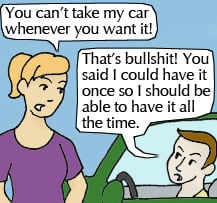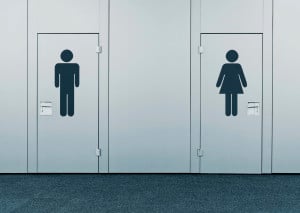
A person wearing all denim stands against a bright red background with their arms folded across their chest.
(This article has been translated here in Spanish.)
If I had a dollar for every time one of you tried to defend cultural appropriation without understanding what cultural appropriation actually is, I might be able to move to an island where I wouldn’t have to worry about this issue anymore.
But then it would still continue to be an issue in the rest of society. And I’d feel kind of guilty about profiting from people’s misconceptions to go relax on an island.
Plus, chances are, some indigenous people were probably displaced to make that island available for me. So let me get to the point before I overthink this (too late?).
The thing is, I’d love for more folks to understand why it’s a problem when people from a dominant culture take cultural elements from a marginalized group without knowing or caring about how their actions affect marginalized people.
Because that’s what cultural appropriation is, and it’s very real and very harmful. But it’s also a complex issue. It’s not as if every instance of participating in another culture counts as appropriation, so it can be hard to keep track of what is and isn’t harmful.
However, the problem shows up when, instead of doing the work of trying to understand and respect people’s cultures and struggles, you dismiss cultural appropriation as a “trivial” issue – just this thing that social justice types bring up to control your behavior through “PC” rules.
You might even think it feels like we’re having the same conversations and over and over again. Someone calls out a celebrity or fashion designer, fraternity or sorority, or Halloween party-goer for committing an act of cultural appropriation – and then we argue about it.
Some people get angry because they think their “freedom of speech” is under attack – and others get angry because their concerns about appropriation are being ignored.
Discomfort is a natural part of social justice work, so I understand why we’re getting angry, and I don’t think strong feelings are a bad thing.
But we’re not really listening to or learning from each other. I know this because when people try to defend cultural appropriation, they so often repeat the same misconceptions about it.
You might find yourself defending cultural appropriation based on some of these misunderstandings.
You say, “But if I can’t wear a headdress, then I can’t appreciate Native cultures at all!” Or “Does avoiding traditionally Black hairstyles mean I can never put my hair in braids? How am I supposed to control my curls?”
These concerns are understandable – but they’re no reason to ignore the problems with cultural appropriation. Avoiding appropriation doesn’t mean you can’t ever participate in another culture or do anything that remotely resembles a culture that’s not your own.
In order to have real conversations about how appropriation causes harm, we have to get on the same page about what we’re talking about.
So here’s what you might be missing if you get defensive about cultural appropriation.
1. Avoiding Cultural Appropriation Doesn’t Mean We Don’t Get to Share Cultures
I’m totally with you if you don’t want to keep everyone isolated within their own culture.
I believe that creating a more equal world requires us to understand one another – and the best way to do that is to listen to each other. We’ll never be able to learn from people who are different from us if we stay segregated from one another.
Sharing things like art, food, and music across cultures has enriched so many of our lives. So I understand if you have an aversion to anything that severs those connections.
But you should know that avoiding appropriation isn’t about avoiding other cultures altogether.
People say, “Cultural appropriation is part of how our modern world was created” – and they’re right. Appropriation has played a part in the inequalities we’re all living with today.
Throughout history, forces like colonization, genocide, and imperialism have forced oppressed groups to give up their cultures to other groups of people who have stolen their land, ravaged their resources, and attacked and killed them.
So yes, when you’re talking about an example like US history, it’s true that our society wouldn’t be what it is today without cultural appropriation’s role in disempowering and dehumanizing indigenous people, immigrants, and people of color.
Is that really a pattern we want to continue? Interacting with other people only by dominating them, eliminating their access to their own culture, and distorting their traditions for our own benefit?
That’s what cultural appropriation does. It’s not the same as respectfully sharing culture through cultural exchange.
So if you think, “I don’t have a problem with cultural appropriation because that’s how we connect with other people and learn from each other,” pause to reflect on what you’re saying.
Cultural appropriation is taking something from a marginalized culture without respect for or knowledge for the people of that culture – and that’s not how we support or learn from each other. It’s one of the ways we contribute to oppression and hurt each other.
But if you’re all for respectfully and consensually sharing our cultures in ways that don’t cause harm, then that’s not cultural appropriation that you’re rooting for. It’s cultural exchange, and I support that, too.
2. Cultural Appropriation Doesn’t Just Cause Offense – It Causes Harm
The items and rituals that spark conversations on appropriation might seem trivial to you.
You hear that people are upset about a Halloween costume, and you roll your eyes and say, “People are just too sensitive these days. They’re looking to get offended by every little thing.”
The more you learn about intersecting systems of oppression – like white supremacy, patriarchy, ableism, and cissexism – the more you realize that there’s a hell of a lot that could offend people. It can feel hard to keep up with it all.
And then on top of that, talking about cultural appropriation can seem like you’re supposed to memorize an endless list of what not to wear. That sounds like a lot of work.
But keep in mind that changing oppressive behavior in your everyday life isn’t about being responsible for other people’s feelings – but it is about taking responsibility for your own actions that can cause other people harm.
Of course you’re going to make mistakes, because you’ll never know everything there is to know about someone else’s life and what might harm them. The best you can do is listen, and consider how your actions can affect other people’s lives.
It’s not that causing offense alone is meaningless. For instance, say you and I are talking one on one about the struggles of Black students in higher education. You make a generalization like, “I wonder if they’d have an easier time if they concentrated more on learning and less on sports.”
I’d be offended by your implication that Black people aren’t intellectual, and I’d probably let you know that you hurt my feelings.
But cultural appropriation has a different kind of impact. If you’re not Black and you take parts of my culture to perform as a Black character who’s a one-dimensional stereotype of an unintelligent gangster, the problem isn’t just that you’ve offended me.
You’re actually perpetuating the common stereotype that Black people are unintelligent and dangerous. You’re playing up the same images that get us turned away from jobs, profiled as criminals, and killed by police.
That causes actual harm. Every single day, people discriminate against Black folks for housing, work, medical care, and more, and call the police on us when we’re doing nothing wrong.
Police are 21 times more likely to kill a young Black man than his white peers. And people who implicitly believe in racist stereotypes (as in, the majority of white Americans) are more likely to think that police brutality against Black folks is justified.
It’s true that you can’t control all of this with a simple Halloween costume. But take a moment to think critically about why so many people believe that stereotypes are true – even without realizing they think that way.
It’s partly because we come across everyday images, like ones of cultural appropriation, that make associations between racial groups and their stereotypes. That impact is what makes appropriation so harmful.
3. Appropriation Includes a Power Dynamic – So It Doesn’t ‘Go Both Ways’
Lots of people fail to account for one essential ingredient to the recipe for cultural appropriation: an oppressive power dynamic between two different groups.
You might ask, “If I shouldn’t steal from your culture, then why is it fair that you can take from mine? Should I be offended when immigrants wear jeans?”
I usually hear the same examples for these questions: What about Native Americans speaking English? Asian people eating cheeseburgers? Black women straightening their hair?
It’s true that when I talk about cultural appropriation, I don’t talk about people of color participating in white American culture. But that’s not because I’m just choosing to pick on white people.
It’s because the context of our history and current culture is very relevant. In the United States, that context includes the fact that whiteness is considered the norm.
When people of color, immigrants, and indigenous people conform to what US society considers “normal,” they’re often doing it for the sake of survival. In order to find jobs, secure housing, stay safe from violence and more, we often have to leave parts of their culture behind to assimilate into white American culture.
Assimilation doesn’t have the same impact as appropriation.
Take the question of immigrants wearing jeans. Do Americans or other Westerners get hurt when non-Western people wear Western styles like jeans?
No – we’re holding up just fine. It’s not as if non-Western immigrants are stealing our great-grandparents’ precious designs and demonizing every American in Levi’s.
Many immigrants wear popular American styles like jeans to fit in – and that doesn’t just mean getting invited to the coolest parties. “Fitting in” through assimilation becomes necessary when your traditional styles of dress have been deemed ugly, “too ethnic,” or even a sign that you’re dangerous.
Consider how different this is from appropriation – like when white Americans imitate immigrants’ clothing just for fun.
For instance, like many Americans, you may associate Cinco de Mayo with getting drunk, wearing sombreros, and taking photos with fake mustaches.
But do you know the real story of what the holiday commemorates – or do you believe the biggest Cinco de Mayo misconception, that it’s Mexican Independence Day?
Do you know how the most visible image of Cinco de Mayo in the US – showing drunken shenanigans and Mexican stereotypes – contributes to the oppression of Mexican immigrants and Mexican Americans in our country?
You have to consider power dynamics when you think about cultural appropriation.
Systems like white supremacy, xenophobia, and Western privilege exist all around you, so you have the power to perpetuate them with your actions. If you’re white and Western, you’re benefitting from these systems the most – and that’s why appropriation doesn’t “go both ways.”
4. What Seems Trivial to You May Be Essential to Someone Else
Just like you can perpetuate white supremacy without meaning to be racist, it’s also possible to appropriate someone else’s culture without meaning to cause harm.
Many people who appropriate don’t have sinister intentions – some are even trying to do a good thing by “honoring” another culture.
To understand how to avoid causing harm when you participate in another culture, you need to be open to the possibility that the people of that culture will have a different perspective than you.
Their perspective is just as valid as yours. But it’s hard for you to really listen to someone if you’re insisting that they approach their culture like you approach yours.
For instance, maybe in your culture, hair is just hair. You’ve had different hair styles, cuts, and colors that help you feel good about yourself. But at the end of the day, you don’t know why anyone would get upset about something as simple as a hairstyle.
It’s perfectly fine if that’s what hair means to you. But for other people, it’s different.
As a Black woman with the kinkiest type of 4C hair, I can tell you how different it can be. I couldn’t ignore the significance of my hair if I tried.
And believe me, I’ve tried. After a lifetime of being pressured to straighten my hair, consistently seeing mostly straight hair depicted as “beautiful” in the media, and struggling to find the right products to take care of my hair, there has been more than one occasion when I wished I could just forget my unruly tresses even existed.
But my hair has always played a big role in my life. It’s always been there for significant moments, like bonding time with my mom, feeling othered in school, and wrestling with the challenges of fitting into “professional” environments.
I’ve learned to take care of my hair, including using protective and natural styles like cornrows, Marley twists, and afros. It’s been a long process with many struggles – including having these same styles called “ugly” and “unprofessional.”
So for me, the process of learning to take care of my hair has come hand in hand with the struggle to love my hair. Loving your hair isn’t easy in this society for a 4C woman like me.
That’s just a snippet of the significance that hair has in my life – just part of why it’s not “just hair” for me when white folks get credit and positive attention for wearing traditionally Black hairstyles.
Both of our realities can coexist – for you, it’s just hair, and for me, it’s much more than something that can be easily dismissed. It helps me and many others survive the weight of white supremacy.
It’s okay to accept that you might not understand why an element of someone’s culture is so important to them – but it’s not okay to invalidate that importance just because you don’t value it the same way.
By invalidating the importance of our cultures, you’re essentially saying, “My worldview says that your cultural traditions are trivial, so they should be meaningless to you, too.”
Believing that people of color are just oversensitive and silly for valuing what helps us survive means buying into the same myths that people use to justify colonization and racism – the ones that say people of color are “backwards” and uncivilized.
5. You Don’t Have to Own Something to Appreciate It
Okay, so maybe you’re starting to grasp the potential harm of cultural appropriation. But you still wonder: Wouldn’t avoiding appropriation do more harm than good? Participating in other cultures is how you appreciate them, so does avoiding appropriation mean the end of appreciation?
Not at all – you can totally appreciate other cultures without claiming them for yourself. In fact, everyone would benefit if we all learned more about how to appreciate other cultures without acting on the urge to claim them.
When you think about what most of our history lessons have taught us, you can see where you might get misguided ideas about what it means to connect with other cultures.
For instance, with common curriculum, many teachers perpetuate harmful myths about Native Americans.
They teach students that Christopher Columbus was a hero who “discovered” America, that European colonizers bravely fought “savage Indians,” and that Native people exist mostly in the past.
The supposedly positive stories of indigenous people “sharing” their culture with colonizers include the one about the Pilgrims at the first Thanksgiving dinner and the one about Pocahontas – and those are both based on complete lies.
These stories originally spread specifically for the purpose of justifying colonization, theft, and genocide. But we continue to tell them, and they can influence your view on what it means to appreciate Native cultures.
They certainly influence plenty of others. Non-Native people use slurs like “redsk*n” as sports mascots, wear disrespectful imitations of sacred symbols like headdresses, and more – then say it’s in the name of “honoring” Native people.
The protests and pushback from Native people should tell you something – this is not the way to show appreciation. If anything, these actions perpetuate stereotypes of Native people as “primitive” and “mystical” – stereotypes that have contributed to threats against their lives for centuries.
So it’s way past time for non-Natives to listen to Native people about how to appreciate them, instead of following the damaging and dominant way of claiming their cultures for ourselves while disregarding their wellbeing.
Adrienne Keene and Taté Walker are two excellent writers who have written about how to appreciate their cultures without appropriation.
It’s possible to find other options and unlearn the toxic pattern of believing you have to claim something for yourself in order to appreciate that it exists.
***
This is my perspective on cultural appropriation, gathered from my personal experience, research, and time spent listening to the many activists, scholars, and marginalized people who have been speaking up about the harm of appropriation since before I was born.
But many people also wonder: How do you know who to listen to? Not everyone agrees, so if some people say appropriation is okay, why do you need to worry about those who say you should find other ways to appreciate their culture?
Well, this isn’t about getting permission from someone deemed gatekeeper of their culture. But if your primary concern is justifying your use of someone else’s traditions, instead of centering the marginalized people who rely on those traditions, it might be time for a shift in perspective.
Let’s drop the hunt for loopholes that might allow us to take from other people, and focus instead on what it really means to support other people.
There are ways for you to genuinely appreciate other cultures, which is wonderful. For instance, you could buy things directly from artists of another culture’s communities and enjoy their crafts without hurting anyone.
But I hope you’ll also consider that your own enjoyment isn’t the only factor worth thinking about here. You can also make an effort to look beyond a culture’s crafts, learn about marginalized people’s lives, and support their movements.
By centering marginalized people’s needs, instead of prioritizing the whims of the dominant group, we can all help interrupt patterns of everyday oppression and turn them into opportunities for understanding.
[do_widget id=’text-101′]
Maisha Z. Johnson is the Digital Content Associate and Staff Writer of Everyday Feminism. You can find her writing at the intersections and shamelessly indulging in her obsession with pop culture around the web. Maisha’s past work includes Community United Against Violence (CUAV), the nation’s oldest LGBTQ anti-violence organization, and Fired Up!, a program of California Coalition for Women Prisoners. Through her own project, Inkblot Arts, Maisha taps into the creative arts and digital media to amplify the voices of those often silenced. Like her on Facebook or follow her on Twitter @mzjwords.
Search our 3000+ articles!
Read our articles about:
Our online racial justice training
Used by hundreds of universities, non-profits, and businesses.
Click to learn more




















